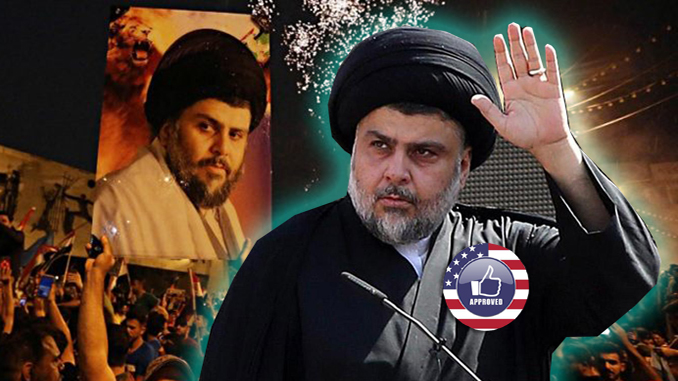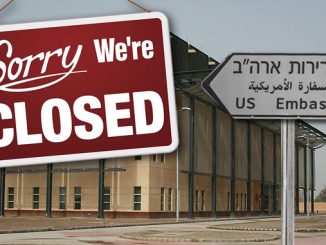
As Iraq continues its descent into chaos, one Shiite cleric offers to make nation great again. Surprisingly, this same man spent years on American military’s most-wanted lists.
By Richard Walker
As Iraq once again shows increasing potential to descend into chaos, a fiery cleric, once at the top of the U.S. military’s most wanted lists, is riding to the rescue, promising stability. He is the iconic, dark-robed Muqtada al-Sadr who spent many years hiding out in Iran where he gave allegiance to Ayatollah Ali Khamenei, Iran’s Supreme Leader.
Al-Sadr’s history no longer troubles many American military and diplomatic figures who watched al-Sadr’s Iraqi political coalition score successes in Iraq’s elections in May this year. Memories of the time when he ran the Mahdi Army and threatened U.S. soldiers occupying Iraq in the wake of the 2003 invasion, have been replaced with a belief that he could now be Iraq’s savior and a potential U.S. ally.
The sudden revisionism lies in the fact that al-Sadr has promised to stamp out corruption and restore public services. These are pressing issues at the heart of the anger fueling serious violence by ordinary Iraqis. They have watched oil flow at an unprecedented rate while the profits have found their way into the accounts of oil corporations, greedy politicians, and powerful clans. Rivers are filling with sewage in parts of the country, and bribery is at an all-time high. Basra, once a jewel in Iraq’s crown, is falling apart.
The American-based writer, Sinan Anton, who was born in Iraq, blames the American invasion 15 years ago, saying what he witnessed in Basra last year was worse than anything under Saddam’s rule. His views about the cause of the chaos are shared by The American Conservative.
The recent defeat of ISIS, while it appeared would like nothing better than a civil war in the country to enable them to gain even more power and territory. And, as militants flee the Russian-Syrian assaults in Syria, they are heading to Iraq.
The striking thing about much of the growing chaos, and the potential for a mass, violent movement to overthrow the established order, is that it is not driven by Sunnis, who fought U.S. troops with Saudi backing after 2003. Instead, the impetus for a revolution is coming from the majority Shiites who are mired in poverty and corruption. Ironically, many of them say they resent Iran’s hold on the political establishment and the fact that Iranian goods are flowing into Iraq while Iraqi production is dying.
In May, as instability grew, al-Sadr arrived like a knight on a white charger, promising to make Iraq great again and to drain the swamp. He also promised a non-sectarian approach with a coalition comprising Sunnis and smaller parties, including communists. Most prominent, however, was his main backer, the pro-Iranian Fatih group that won 47 seats to al-Sadr’s 54, giving both the controlling bloc in the Iraqi parliament. Fatih’s leader, Hadi al-Amiri, also runs the massive pro-Iran militia, the Badr Brigades. With al-Amir at his side, al-Sadr is now the Iraqi kingmaker, telling the Iraqi prime minister to pack his bags. Some suspect that Tehran dispatched him to bring stability to Iraq because an internal conflict would not suit Tehran.
Col. Michael D. Sullivan, who served five tours in Iraq and fought against al-Sadr’s Mahdi Army, sees it differently and appears to speak for many in Washington when he says this is a new al-Sadr we’re seeing. He points to the fact that al-Sadr disbanded his Mahdi Army in 2011, ordered them not to attack U.S. troops, and three years later marshalled them to fight ISIS. If some critics think Sullivan’s assessment is wishful thinking, he counters that the cleric is nowadays an Iraqi nationalist and pragmatist, posing no threat to the United States. Former U.S. Ambassador to Iraq James Jeffery seconds his analysis, telling USA Today, “Al-Sadr can be irrational, but he is better than the Iranians taking over.”
It could also be argued that the Iranians will not have to take over Iraq when al-Sadr is running the country with the pro-Iranian Fatih group, its Badr Brigades, and the Mahdi Army.
It is not often acknowledged that Iraq shares a border with Iran, so those making accusations that a politico-religious nexus between the two nations is malign ignore the close historical, religious, and familial connections binding the two countries.
But it is in the shadows that trouble may be lurking.
Israeli warmongers led by Prime Minister Benjamin Netanyahu are consumed with a desire to have the U.S. go to war with Iran, knowing it would have support from the many pro-Zionists in Congress.
In an example of classic irony, The White House recently threatened Iran with retaliation for an attack on U.S. facilities in the Green Zone in Baghdad even though Iran’s embassy in Basra was set alight and ransacked at the same time. The threat pleased the hawks in Tel Aviv.
For now, there are expectations al-Sadr will support the U.S. military presence in the country, but that could change if Israel initiates a confrontation between America and Iran.
On the other hand, if Sullivan is right, al-Sadr will not seek to anger Washington. While the Pentagon considers him a policy bonus, alliances in the Middle East are fragile when based on self-interest. He could become the cleric with a target on his chest once again if hawks in Washington, Riyadh, and Tel Aviv have their way.
Richard Walker is the pen name of a former N.Y. news producer.





As long,as you do not send it to your corrupted ‘ deep state’ politicians,it isuseless to write or publish in tht synagogue of USAtan!